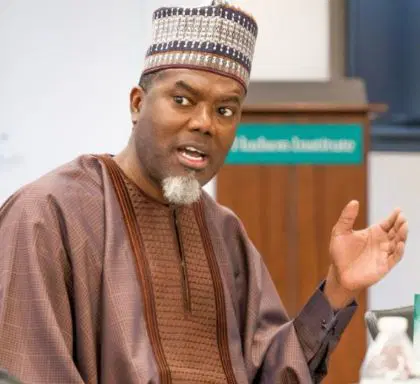A former presidential aide, Mr. Reno Omokri, has insisted that deaths arising from violent clashes in Nigeria, especially in the northern region, are not motivated by religion, but are rooted in historical and economic factors. He delivered this message during a lecture titled, “Speaking Truth to Power in Contemporary Nigeria,” at the Oxford African Governance Forum in the United Kingdom over the weekend.
Omokri’s lecture comes in the wake of US President Donald Trump declaring Nigeria a Country of Particular Concern (CPC), citing allegations that Christians were being systematically targeted and killed in the country. Trump’s designation came with threats of military action if the Nigerian government failed to stop the supposed killings.
President Bola Tinubu, in a strong response, denied the US designation, affirming that his administration is committed to protecting all Nigerians, regardless of religion or ethnicity. Omokri’s lecture supported the president’s position, arguing that the US claim was based on misinformation and lacked factual basis.
“It is condescending for President Donald Trump to say that the Nigerian government allows Christians to be killed,” Omokri said. He added, “Does it make sense to say that the American government allowed the terrorist who attempted to kill President Trump two years ago?”
Omokri challenged the US president and Senator Ted Cruz, a vocal advocate of the CPC declaration, to provide names and evidence of Nigerian officials allegedly facilitating the killings. He further debunked claims of rising terror-related deaths, citing the Global Terrorism Index. According to Omokri, deaths linked to terror attacks in Nigeria have fallen by 90% over the past decade, dropping from 7,000 in 2015 to 500 in 2025.
The former aide traced the roots of violent clashes to economic competition over land for farming and grazing, a challenge that predates Christianity in Nigeria. Omokri referenced the Kwararafa Kingdom, which historically spanned from Zuru in Kebbi State to Gembu in Taraba State, noting that killings over land disputes existed centuries before the arrival of Christian missionaries.
He also cited colonial records from 1924 that highlighted rising tensions between farmers and herders, showing that conflicts over land have long been a security issue in Nigeria. At that time, Nigeria’s population was about 18 million—10 million in the North and 8 million in the South. Today, with over 200 million people, the competition for limited land and resources has intensified.
Omokri explained that population growth, combined with economic pressures, has made clashes more frequent. He argued that violent confrontations in northern Nigeria are largely driven by these practical considerations rather than religious differences.
The former presidential aide highlighted steps taken by the Nigerian government to reduce clashes, including the introduction of the Fadama all-year-round farming method and the establishment of the Livestock Development Ministry by President Tinubu’s administration. He said these measures aim to reduce competition over land and encourage sustainable farming and livestock practices.
Omokri also addressed the role of political actors in spreading allegations of Christian genocide. He blamed the Labour Party presidential candidate in the 2023 general elections, Mr. Peter Obi, for promoting misleading narratives about religious persecution in Nigeria. Omokri argued that the allegation gained international attention after Obi addressed a US Congress committee earlier this year.
He further criticized Obi for defending the Indigenous People of Biafra (IPOB) as a non-terrorist organization, despite its proscription under Nigerian law. Omokri pointed out that leading members of IPOB, including Mr. Simon Ekpa, have been convicted for terrorism, while the group’s leader, Mr. Nnamdi Kanu, is awaiting judgment in the coming weeks.
Concluding his lecture, Omokri urged for a more balanced and data-driven approach when evaluating Nigeria’s security situation. He emphasized that misleading claims about religious violence could exacerbate tensions and harm Nigeria’s international image.
“If we as a people can transcend religion and ethnicity, we will build a strong, united, and peaceful nation,” he stated. Omokri said that solutions to Nigeria’s security challenges must focus on economic development, sustainable land use, and proper law enforcement rather than attributing conflicts to religion.
The former aide’s lecture forms part of the Michael Mas Conference Series at the Oxford African Forum, where scholars, policymakers, and public figures discuss governance and social issues affecting African countries. His presentation aimed to provide clarity on Nigeria’s situation and counter what he described as “foreign misconceptions” about Christian persecution in the country.
